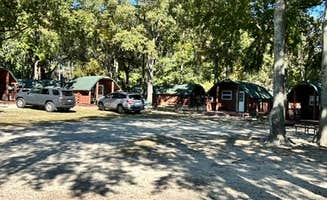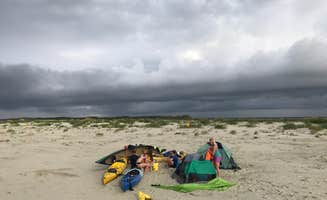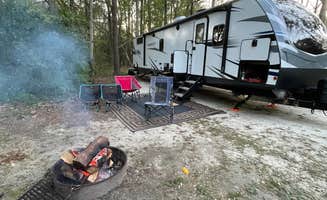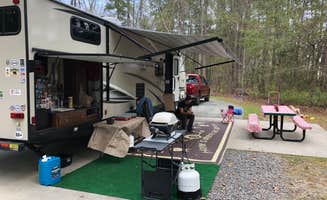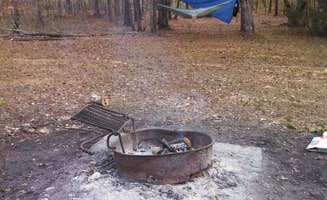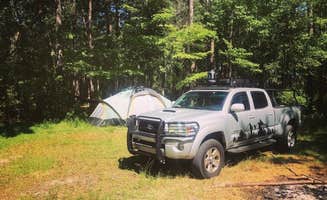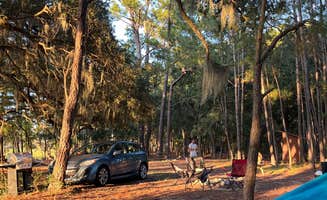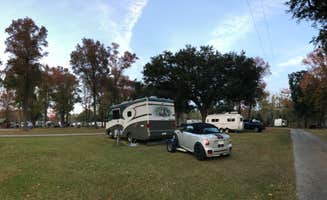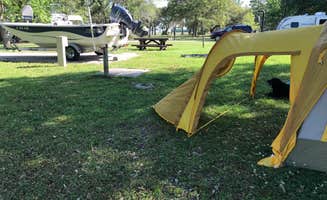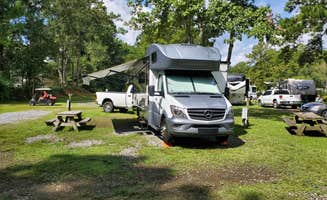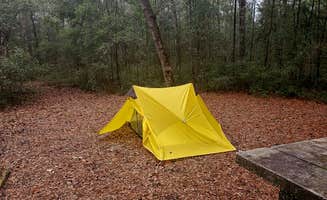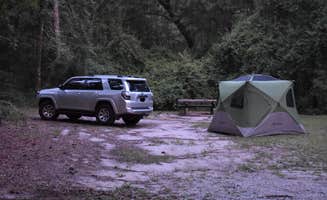Camping near Mt Pleasant, SC offers diverse options within a quickly growing coastal region. The area features a mix of old-growth maritime forests alongside vast marshlands and waterways feeding into Charleston Harbor. Seasonal challenges include high humidity from May through September, with average summer temperatures reaching 92°F and frequent afternoon thunderstorms that can cause temporary flooding at waterfront sites.
What to Do
Kayaking and wildlife viewing: At Hanscombe Point Campground, visitors can observe abundant wildlife along Hut Creek and the surrounding marshes. "We had awesome dolphin encounters. The crabbing is great at the campground and we had a delicious crab boil as a result!" notes a camper at Buck Hall Recreation Area.
Hiking forest trails: Francis Marion National Forest provides hiking opportunities through maritime forest canopy. "Hiking a section of the Palmetto Trail is a good option for a day out of the sun due to the heavy maritime forest canopy," reports a visitor to Buck Hall Recreation Area.
Farm animal interactions: Some campgrounds feature unique farm settings. "Nothing could be better than waking up to livestock outside your window grazing. They are so beautiful and the view from every angle is amazing," shares a guest at Hanscombe Point Campground.
Disc golf courses: Multiple recreational activities are available at certain parks. "West of this Outdoor Zone is an 18-hole disc golf course and back towards the center of the park," explains a reviewer at James Island County Park.
What Campers Like
Proximity to Charleston attractions: The strategic location provides convenient access to urban amenities. "Located only 15 minutes from downtown Charleston and 10 minutes from Shem creek this campground is gorgeous and spacious," writes a visitor to Mount Pleasant-Charleston KOA.
Plantation tours: Some campgrounds offer unique historical experiences. "They also had a free wagon ride to a nearby plantation a couple of times a week. We actually missed it but would really like to take the time to do it if we ever get back," notes a camper at Mount Pleasant-Charleston KOA.
Fishing opportunities: Multiple waterfront locations provide fishing access. "The lake had a little dock and we my husband and son fished off of it. There were alligators in the lake and they actually caught one," reports a camper at Mount Pleasant-Charleston KOA.
Peaceful water views: Waterfront sites offer tranquil settings away from urban environments. "Nice free overnight parking spot. Public boat ramp so people will be in and out of the water at all hours of the day, not quiet. Beautiful sunsets if you can arrive in time for them," describes a visitor at Remleys Point Public Boat Launch.
What You Should Know
No-see-ums and mosquitoes: Biting insects are prevalent in coastal areas. "Nnothing could be better than waking up to livestock outside your window grazing. They are so beautiful and the view from every angle is amazing," states a camper from Hanscombe Point Campground.
Traffic considerations: Traffic congestion affects travel times throughout the region. "The road in front of campground is extremely busy (Hwy 17) and I wouldn't attempt ever turning left to get out. Just take a right and another right behind campground to get you out," advises a visitor to Oak Plantation Campground.
Seasonal crowds: Popular attractions draw large numbers during peak times. "Should you be driving an RV, hitched to a 5th Wheeler or hauling a trailer, whatever your mobile camping experience might be, there's 116 campsite options to choose from here at James Island Co Park," explains a reviewer at James Island County Park.
Base noise: Some campgrounds have proximity to military or transportation infrastructure. "You expect this on base. But boy, it is way-beyond-reasonable loud!!!!!! As for local recreation beyond base, it is a quick jaunt either to the west or east gates to get on roads into town," notes a military camper at Joint Base Charleston.
Tips for Camping with Families
Water recreation options: Family-friendly water features enhance the camping experience. "Our site was very close to the lake and we had a great view. We were also right beside the pool and playground area so it was convenient to walk over," shares a camper at Charleston KOA.
Playground facilities: Multiple campgrounds feature play areas for children. "Pretty fantastic place for families. Awesome trails, huge playground, water park, fishing, rock climbing walls, and very close to folly Beach, which is gorgeous," notes a visitor to James Island County Park.
Educational wildlife viewing: Learning opportunities abound at certain locations. "The nearby Sewee Visitor Center has red wolves and is free to visit. They also have RV parking! We enjoyed this, but if you have kids I think it would be a must do! You can call ahead and find out when they will be feeding the wolves," advises a camper at Buck Hall Recreation Area.
Dog-friendly amenities: Many sites accommodate family pets with designated areas. "There's a beautiful lake that allows catch and release fishing. Some tent sites and cabin sites are right along the water and offer nice views. There's a one mile loop trail through the woods and along the lake. There are waste bags scattered throughout the park and a huge dog park," explains a visitor at Mount Pleasant-Charleston KOA.
Tips from RVers
Site spacing variations: Different campgrounds offer varying levels of privacy between sites. "Large park with paved and grass sites. I stayed in a paved full hookup site P2 and, even though there were a fair amount of guests, they spread everyone out so I had no immediate neighbors," reports an RVer at Oak Plantation Campground.
Level site considerations: Terrain affects setup ease at different locations. "Sites are spacious, covered with trees, full hookups with 50 amp service," notes a visitor to James Island County Park.
Ant prevention: Local pest issues require specific precautions. "We got a tip from a neighboring RVer to spray for small ants anywhere that the RV touches the ground so the ants won't crawl up and get in our RV as it did theirs. We promptly went to buy ant spray and never had a problem," advises an RVer at Oak Plantation Campground.
Site size limitations: Space constraints affect larger vehicles. "May want to watch for low overhangs if your vehicle is over 12ft tall," cautions a visitor to Remleys Point Public Boat Launch.


